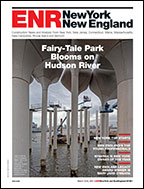The Millennial generation will compose the majority of the construction workforce by 2018, according to the U.S. Census. They are entering in a torrent that can either infuse energy into firms or drown them. Each company will choose what happens by how it adapts to new styles of recruitment, management and retention.

Call them Millennials, Generation Y or Generation Next—all these names are used—but demographers interviewed by ENR and many Millennials themselves agreed the names all try to classify a distinctive group of Americans born after about 1980 who are part of a wave that continues today. Each year, this rising generation of construction professionals and craftspeople gets more relevant not only because of its growing numbers in the workforce but because of the singular qualities it brings. One key quality of Millennials is that they are digital natives—they barely remember the era before computers.
Millennials told ENR they want two things from the construction industry: respect and change, and they likely will get both. The vacuum created by the large numbers of baby boomers (born between 1946 and 1964) now beginning to retire will draw Millennials into managerial roles at an early age.
“The biggest challenge facing the construction industry today is the transition of power to the Millennial generation,” says Jennifer Gross, a 26-year-old design engineer in San Francisco. “Our generation will change how management and employees interact in the A/E/C industry. We have a different approach to the work/life balance [and] the drive to change the industry.”
In order to mentor the next generation of construction professionals, baby boomers must understand the Millennial mind-set to help groom them for leadership roles. Gross and her peers also are searching for ways to prepare themselves to fill the many positions that will open up as boomers retire. “Many of us know we can move quickly,” says Elizabeth McAndrew-Benavides, a 31-year-old manager of industry infrastructure at the Nuclear Energy Institute at Washington D.C. “I went from assistant engineer to engineer to senior engineer in three and a half years.”
Banding together is one strategy that comes naturally to Millennials, and they have done just that in forming the Construction Millennials of America, a Facebook-powered group for Millennials only.
Like generations before them, the Millennials’ lives were molded partly in response to perceived shortcomings of the preceding generation, Gen X, born between 1965 and 1981. In 1983, Terrel Bell, then U.S. secretary of education, released “A Nation at Risk,” a report on the state of the U.S. education system that gave it a failing grade, and, among myriad other societal influences, caused boomers to heighten their involvement in their children’s development, demographers say.
Boomers were more informed by scientific studies and child-centered media (Child magazine launched in 1986, Parenting magazine in 1987) than any previous generation, researchers say, and that changed the child-raising environment. According to a University of Michigan Institute for Social Research study, during the period from 1981 to 1997, the amount of time kids aged three to 12 spent watching TV dropped by 23%, while the time they spent playing sports organized by teachers and parents increased by 27%.
Many Millennials grew up being shuttled from teachers to tutors to coaches and then back to the parents. They had far less unsupervised free time than their parent’s generation and, as a result, are comfortable working with older adults, says Charles Underwood, a demographer and founder of The Generational Imperative Inc., Miamisburg, Ohio.
“Millennials have a significant respect, reverence and trust of older people,” Underwood says. “They came of age with parents, teachers and counselors who were their best friends and role models. They not only need a mentor, they need a buddy. They are excellent team players. They will care about the entire organization, not just their own jobs.”
But on the flip side, Underwood says Millennials postpone commitments to career, marriage and parenting. He links the lack of commitment to the job-hopping characteristic of the group, something the Millennials themselves confirm.
“If the organization isn’t the right fit, it’s perfectly socially acceptable for us to jump,” says McAndrew-Benavides. She cautions younger colleagues not to give up too quickly. “Sometimes you have to do work you don’t necessarily love for six to 12 months to get where you want,” she says.
Underwood says companies that do not meet the Millennial’s expectations will have to “settle for the second-tier employees.”
Lukas Petrash, a 27-year-old architect in Houston, is similarly impatient to get on. “This generation has a lot of good ideas and talent and wants to use that immediately,” he says. “We are used to the Internet, where you can become an instant success overnight.”
In a display of devotion to sustainability that is typical of Millennials, Petrash founded Adia (thinkadia.com), an uber-eco, cost-effective house prefabrication company that sells $30,000 house kits that ship anywhere in the world for $3,000.



